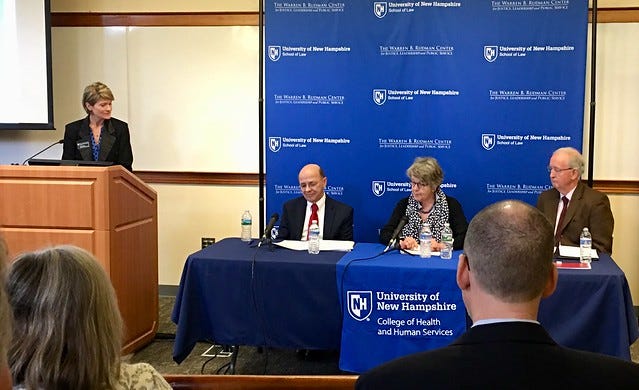RWL Newsletter #117

Greetings from the University of New Hampshire! Picture is of my colleague Lucy Hodder of UNH Law and the Institute for Health Policy and Practice moderating a panel on Health Care Costs today at the Law School. This is what makes being an academic so cool - you can go to events like this and hear amazing thinkers and doers talk - like Joseph Antos of AIE, Trish Riley of NASHP, and John McDonough of Harvard.
Read
What: Forbes, How to Have Difficult Conversations at Work
Why: On Monday, my students Erin and Liv presented about how to deal with difficult conversations. We had a great conversation about it. This is a short read that summarizes some key points on how to go about doing this very difficult, but critical managerial function. I particularly liked (and have both used and failed to use) this advice:
When having a difficult conversation, be direct and get to the point quickly. This is not the time for feedback sandwiches or an excess of compliments. Both of these feedback techniques will mask the point of the conversation and lessen its impact.
Check out the whole thing - it’s a 10 minute read.
Watch
What: the firing scene from Moneyball
Why: Tying in to the Forbes article above, the passage I quoted made me think of this scene from Moneyball. Of course, those of us who have fired people know it’s rarely that clean. It’s fun to watch, though.
Listen
What: Econtalk, Jacob Stegenga on Medical Nihilism
http://www.econtalk.org/jacob-stegenga-on-medical-nihilism/
Why: This interview is about Stegenga’s book Medical Nihilism. From the podcast site:
Stegenga argues that many medical treatments either fail to achieve their intended goals or achieve those goals with many negative side effects. Stegenga argues that the approval process for pharmaceuticals, for example, exaggerates benefits and underestimates costs.
This is a skeptical look at medicine, and particularly pharmaceuticals. While giving a nod to antibiotics as silver bullets, Stegenga suggests the value of much of modern medicine is no more effective than medicine of old, and maybe there is a case for minimal intervention. I’ll be honest, this plays to my priors, so I received this interview with little personal skepticism. I haven not read the book yet, but I’m putting it on my list.
Thanks for reading and see you next week! If you come across any interesting stories, won't you send them my way? I'd love to hear what you think of these suggestions, and I'd love to get suggestions from you. Feel free to drop me a line by e-mail, or you can tweet to me at @mbonica .
Also, if you find these links interesting, won’t you tell a friend? They can subscribe here: https://tinyletter.com/markbonica
Have a great weekend and do amazing things!
Mark
Mark J. Bonica, Ph.D., MBA, MS
Assistant Professor
Department of Health Management and Policy
University of New Hampshire
(603) 862-0598
mark.bonica@unh.edu
Health Leader Forge Podcast: http://healthleaderforge.org
"I know of no more encouraging fact than the unquestionable ability of man to elevate his life by a conscious endeavor." - Henry David Thoreau


